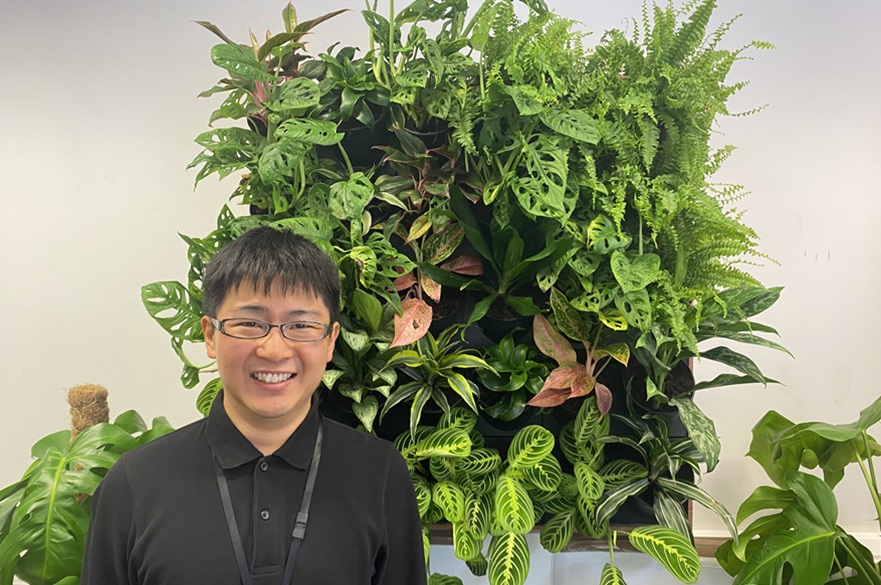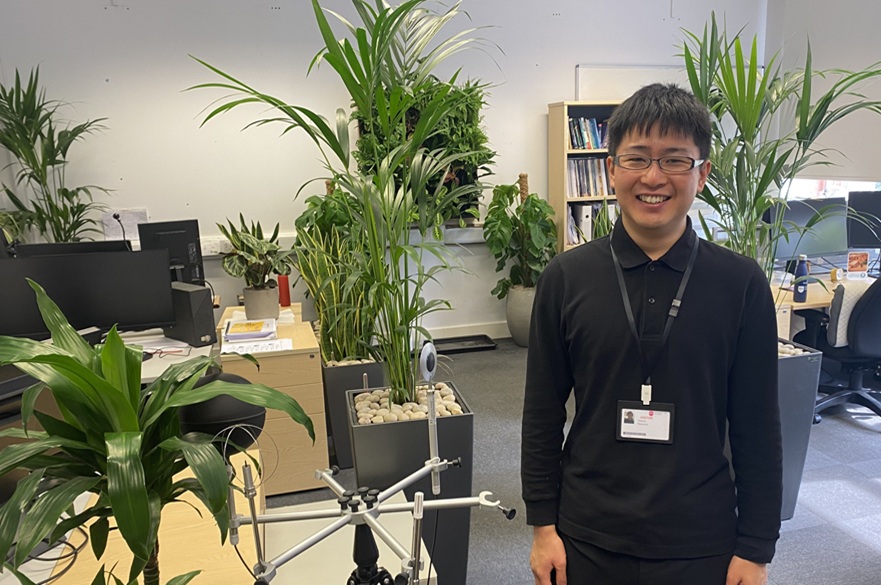Green office to help researchers understand how nature improves your health
By Chris Birkle | Published on 17 July 2025
Categories: Press office; Research; School of Architecture, Design and the Built Environment;

Researchers at Nottingham Trent University (NTU) are investigating how indoor plants may improve the health and wellbeing of office workers.
A team of biophilia experts have developed a ‘green’ office with more than 20 plants and a green wall in order to monitor whether, and in what ways, people working among greenery develop improved health.
Participants will have their heart rate and blood pressure monitored while working in the green office, and this will be compared to their measurements while working in a separate office space which features no plants.
The project is led by Professor Emeritus Derek Clements-Croome, who is also a visiting professor at NTU from University of Reading, with Dr Yangang Xing, an associate professor at NTU, and Dr Tatsuya Matsuoka, a visiting scholar at NTU from Shimizu, Japan.
Dr Matsuoka said: “While it’s commonly believed that being surrounded by nature is good for your health and wellbeing, we’re keen to design a methodology which can prove whether or not this is the case in an office environment.
“When you consider how many people work in offices around the world – whether onsite or from a home office – the implications for people’s wellbeing could be considerable.
“And with increasing interest in healthier work environments, our findings could help shape how offices of the future are designed and maintained for long-term health benefits.”
The study is taking place until December this year and will result in published research which will be open for the public to read free of charge.
The chosen plants are selected based on related research carried out by the North American Space Agency (NASA) for their air-filtering abilities, primarily for their capacity to remove volatile organic compounds (VOCs).

Dr Tatsuya Matsuoka in the biophilia office
They include tall plants such as the kentia palm, barrier plants like the sansevieria, as well as snake plants, monsteras, the Dracaena Janet Craig and more.
A series of short tests of 30 minutes per participant will take place this summer before 24 hour tests will take place later in the year for a more detailed analysis.
Participants will wear Google Fitbit 6s to monitor their blood pressure and heart rate and be asked a series of questions about their experience of working in both environments.
Their wellbeing outside of the office, including quality of sleep, will also be monitored as part of the later study.
Dr Matsuoka is working at NTU for a period of 12 months before he returns to the Institute of Technology at Shimizu Corporation in Japan.
The plant scaping was done in collaboration with the Benholm Group, a company in Falkirk which specialises in interior plant scaping to support biophilic design.
Research supervisor Professor Clements-Croome said: “We are connected to nature and it affects us deeply in many ways physically and mentally. At a fundamental level, nature makes an impact on the brain and hence decision-making.”
Research supervisor Dr Yangang Xing, of NTU’s School of Architecture, Design and the Built Environment, said: “Biophilic design may not only support employee wellbeing but could also enhance productivity and job satisfaction over time.
“We hope that this study will pave the way for further international collaborative research into optimising inclusive biophilic design and will inform better designed work places to support human health, well-being, and contribute to one-planet health over time.”
Notes for Editors
Press enquiries please contact Chris Birkle, Public Relations Manager, on telephone +44 (0)115 848 2310, or via email.
Nottingham Trent University (NTU) has been named UK ‘University of the Year’ five times in six years, (Times Higher Education Awards 2017, The Guardian University Awards 2019, The Times and Sunday Times 2018 and 2023, Whatuni Student Choice Awards 2023) and is consistently one of the top performing modern universities in the UK.
It is the 3rd best modern university in the UK (The Times and Sunday Times Good University Guide 2023). Students have voted NTU 1st in the UK for student employability (Uni Compare 2025)
NTU is the 5th largest UK institution by student numbers, with over 40,000 students and more than 4,400 staff located across six campuses. It has an international student population of almost 7,000 and an NTU community representing over 160 countries.
NTU owns two Queen’s Anniversary Prizes for outstanding achievements in research (2015, 2021). The first recognises NTU’s research on the safety and security of global citizens. The second was awarded for research in science, engineering, arts and humanities to investigate and restore cultural objects, buildings and heritage. The Research Excellence Framework (2021) classed 83% of NTU’s research activity as either world-leading or internationally excellent.
NTU was awarded GOLD in the national 2023 Teaching Excellence Framework (TEF) assessment, as it was in 2019.
NTU is a top 10 for sport (British Universities and Colleges Sport league table 2023).
NTU is the most environmentally sustainable university in the UK and second in the world (UI Green Metric University World Rankings, 2023).